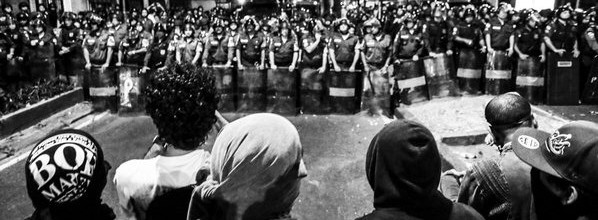State repression and social movements: the case of Abahlali and recent Brazilian uprisings

‘State repression and the Right to the City in South Africa: the story of the shack-dwellers movement of South Africa’ S’bu Zikode and ‘Brazilian uprising: Police violence diffusion and the update of the internal enemy’ Matheus Grandi
S’bu Zikode, founder of the ‘shack-dwellers’ movement Abahlali baseMjondolo in South Africa
Matheus Grandi, Visiting Researcher in Leeds, Contested Cities Brazil
On 13th November 2013, Contested Cities Leeds hosted a discussion on recent social movements and state repression in both South Africa, focused on the case of recent struggles and repressions of Abahlali base Mjondolo. S’bu spoke of the current movement and after a screening of ‘Dear Mandela’ led discussions focused on the state of struggles in South Africa. Following this Matheus Grandi discussed the recent social movements and uprising in Brazil, focused on state repression.
the discussions are available from the link below
S’bu Zikode spoke on the recent uprisings and political situation in South Africa focusing on the struggle for human dignity over private profit; for land, cities, wealth and power that are shared. Abahlali base Mjondolo’s story is one of great inspiration as well as a huge and on-going challenge. S’bu’s talk was inspirational, the full talk is available online at:
For more information on the Abahlali struggle please visit
https://www.facebook.com/abahlalibasemjondolo
Or check out the film
http://www.dearmandela.com/
Brazilian uprising: Police violence diffusion and the update of the internal enemy
Matheus da Silveira Grandi
Brazil has gained prominence in the global political and economic scenario during last decade. This position has consolidated its role as a Latin American regional power, and also strengthened its sub-imperialist economical practices. Governed by the Labour Party (PT) along this period, the state had some widely advertised social goals, as the reduction of social inequalities, the increasing of purchasing power, the spreading of public health and education rights, and even an initial review of the dictatorial past of the country. All these achievements were accompanied also by the co-optation of social movements and trade unions by the state negotiation apparatus. As a result it is possible to talk about a mitigation of social conflicts, a process saw also in other countries of the continent even though the social problems and disparities remain enormous. However, the largest popular demonstrations in the recent Brazilian history emerged from this apparently calm social background on June of 2013. Such completely unexpected event put millions of Brazilians on the streets in the wave of protests that have been called June Journeys. The multiplicity of agendas shouted and exposed in countless banners was object of different evaluations and interpreted in various ways by political groups and organizations. In turn, the state answers to the popular claims included a more intense, strong, and radical police presence in these huge public meetings. Here we reflect on some of the immediate consequences of these events, based on our direct participation in the events, newspaper articles, and other political materials published between June and July of 2013. The relationship between at least three different perspectives about the protests — the traditional electoral leftist political parties, the traditional “right-wing” liberals, and the left libertarian organizations— expresses the disputes around the social construction of a legitimate repression against protesters. Such legitimation acts as an assumption for diffusion of police violence beyond the territories of exception historically settled across the country. We suggest that this is part of a process that remakes the political subject considered by the state as its “internal enemy “, splitting the demonstrators between “protesters” and “vandals.” Finally, we consider that this on-going process —that identifies this new subject, typifies them legally, and criminalises their existence and socio-spatial practices— is deeply related both to a political and economic context of preparation for the further mega-events (2014 FIFA World Cup and 2016 Olympic Games).
